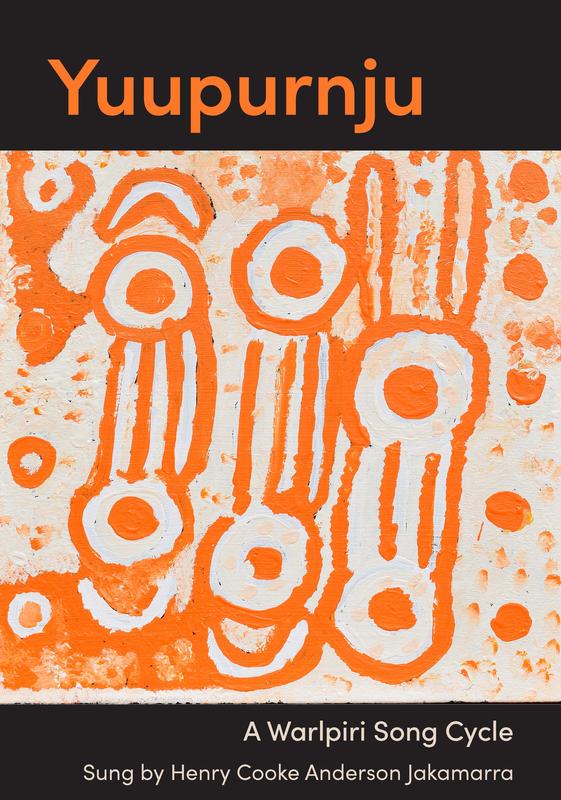Yuupurnju: A Warlpiri Song Cycle

Yuupurnju is a genre of ceremonial song cycles situated within the kurdiji ceremony. The song cycle relates to a traditional women’s jukurrpa story. A group of ancestral women travel across the country, dancing and singing at significant locations. Henry Cooke Anderson Jakamarra, the singer, describes the song cycle as women’s Dreaming, and names himself as the person in a kurdungurlu relationship who can sing the songs. This was confirmed by other senior kurdungurlu and by a senior man in a kirda, owning patrimoiety, relationship to the song cycle.
Henry Cooke Anderson Jakamarra, a senior Warlpiri man and the singer of this song cycle, requested that these songs be recorded, kept safely and made available for future generations to learn from. Yuupurnju is normally sung only by a group of men during a man-making ceremony, from about 10pm until dawn. But Jakamarra was particularly interested in the song cycle being recorded and saved for younger men to learn, and so invited Carmel O’Shannessy, a linguist with a long-term relationship with the community, to record him singing them solo.
The recordings took place in August 2013 in the front yard of the house in which O’Shannessy was temporarily staying, across from where Jakamarra lived. He sang them in the daytime, singing for one to three hours most days, over three weeks, recorded by O’Shannessy. Over subsequent years, O’Shannessy worked with Jakamarra, Jerry Patrick Jangala OAM, Steven Dixon Japanangka and Wanta Jampijinpa to transcribe the words and provide interpretations of the meanings of the verses. Myfany Turpin, a linguist and ethnomusicologist, wrote down the verses (sung syllables and rhythm).
The words of ceremonial songs are sometimes different from the words in everyday Warlpiri speech. Some of the words might have been used long ago and have changed over time. Others words are used only in traditional songs and not in everyday spoken Warlpiri; many of these resemble the everyday spoken words in neighbouring languages such as Anmatyerr and Kaytetye. Sometimes words are shortened or extended to fit a preferred rhythm. There can also be words that are the same as spoken language but that have complex meanings in the ceremonial context in addition to their everyday meanings. For these reasons, there is not always a one-to-one relationship between words in the songs and words in modern spoken Warlpiri.
Buy the book from Sydney University Press: Yuupurnju: A Warlpiri Song Cycle
Musical performances
In this recording of Yuupurnju, Jakamarra sang some 1,335 songs, comprising 38 unique verses. Each song lasted 30–60 seconds. Yuupurnju: A Warlpiri Song Cycle presents musical and textual interpretation of the 38 songs below.
Yuupurnju: A Warlpiri Song Cycle audio recordings (38 songs)
| 1. Kanaku kanakurla | |
| 2. Karrinjapardi | |
| 3. Tangkirrina | |
| 4. Wujuju-wangkanya | |
| 5. Yajankurlarri | |
| 6. Yanganpa | |
| 7. Yarrintilarnu | |
| 8. Jinapi | |
| 9. Miyinmarrirla | |
| 10. Manja kurrkurrku | |
| 11. Jujuju japarnti | |
| 12. Walangkaju | |
| 13. Palararrararra | |
| 14. Kartiwirntinya | |
| 15. Warrawarra | |
| 16. Yuluwurru | |
| 17. Yangipi yantakuyanta | |
| 18. Karnta wurrparna | |
| 19. Waku mirntirrirla | |
| 20. Warakija | |
| 21. Waku jumpurujumpuru | |
| 22. Yalurrpalurrpungulu | |
| 23. Yarlangki | |
| 24. Yinirnti | |
| 25. Warnamarra | |
| 26. Jurdurrungkarni | |
| 27. Jipily jipily | |
| 28. Wulpayi | |
| 29. Kurlarda wangardijarrili | |
| 30. Wawirrina | |
| 31. Wurnapa ngarrkanta | |
| 32. Ngati mulyumulyu | |
| 33. Ngapakurla | |
| 34. Lyinjirrmarlinja | |
| 35. Wardijayi | |
| 36. Junpurla | |
| 37. Yirarri-rarri-manu | |
| 38. Pinapi-rnalu |